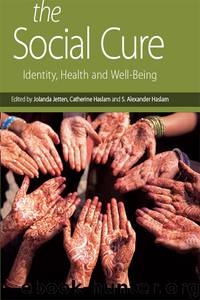The Social Cure by Jolanda Jetten Catherine Haslam & S. Alexander Haslam

Author:Jolanda Jetten, Catherine Haslam & S. Alexander Haslam
Language: eng
Format: epub
Publisher: Psychology Press
Proposition 3
The capacity for an organizational stressor to induce stress will vary as a function of its relevance to an organizational identity that is currently salient.
Proposition 2 concerns the capacity for shared organizational identity to engender positive primary appraisals of workplace stressors through its tendency to promote positive forms of intra-organizational interaction. Independent of these dynamics, though, it should also be the case that the implications of any given stressor for the self will depend upon its relevance for the organizational identity that defines an individual's sense of self in any given organizational context. In other words, the impact of a given stressor will generally be moderated by the relevance of that stressor for a salient social identity.
Evidence that this is the case emerges from a programme of research conducted by Levine and Reicher (1996; Levine, 1999; see also St. Claire & Clucas, this volume). These researchers conducted an initial study with female sports scientists in which they found that when the women's gender identity was salient they perceived the stress of a threat to their attractiveness (e.g., a facial scar) to be much more serious than they did when their identity as sports scientists was made salient. On the other hand, when participants’ identity as sports scientists was made salient, they found the stress of a threat to their fitness (e.g., a knee injury) much more serious than when their gender identity was salient. Very similar patterns also emerged from a follow-up study of female secretaries in which threats (e.g., a facial scar vs. repetitive strain injury) related either to the participants’ gender identity (as women) or their professional identity (as secretaries; Levine, 1999).
It is not the case, however, that simply because a stressor is perceived as more relevant to an organizational identity that is salient for an individual in a particular context that it will necessarily lead to more stress. In particular, this is because the group itself can be a powerful mechanism for helping people to cope with, neutralize, and sometimes counteract, that stressor. Again, support for this suggestion emerged from the study of bomb disposal officers and bar staff that we have already discussed (Haslam et al., 2005). Here, as well as rating their organizational identification, job satisfaction, and stress, the participants were also asked to evaluate the stressfulness of handling bombs and serving in a bar. As one might expect, pretesting among the general population indicated that the job of handling bombs was perceived to be much more stressful than that of working in a bar, and indeed this was the pattern revealed by the responses of bar staff in the study. Bomb disposal officers, however, reported the opposite pattern. While bar staff were thus relatively untroubled by the stresses of bar work, bomb handlers were equally unfazed by the stresses of handling bombs. This would tend to suggest that individuals’ experiences as members of these different groups had allowed them to normalize aspects of work that might be quite abnormal and threatening to the uninitiated (Ashforth & Johnson, 2001).
Download
This site does not store any files on its server. We only index and link to content provided by other sites. Please contact the content providers to delete copyright contents if any and email us, we'll remove relevant links or contents immediately.
Rewire Your Anxious Brain by Catherine M. Pittman(18657)
Talking to Strangers by Malcolm Gladwell(13375)
The Art of Thinking Clearly by Rolf Dobelli(10490)
Mindhunter: Inside the FBI's Elite Serial Crime Unit by John E. Douglas & Mark Olshaker(9345)
Becoming Supernatural by Dr. Joe Dispenza(8223)
Change Your Questions, Change Your Life by Marilee Adams(7786)
Nudge - Improving Decisions about Health, Wealth, and Happiness by Thaler Sunstein(7711)
The Road Less Traveled by M. Scott Peck(7605)
The Lost Art of Listening by Michael P. Nichols(7507)
Mastermind: How to Think Like Sherlock Holmes by Maria Konnikova(7350)
Enlightenment Now: The Case for Reason, Science, Humanism, and Progress by Steven Pinker(7315)
Win Bigly by Scott Adams(7202)
The Way of Zen by Alan W. Watts(6619)
Daring Greatly by Brene Brown(6517)
Big Magic: Creative Living Beyond Fear by Elizabeth Gilbert(5778)
Grit by Angela Duckworth(5617)
Ego Is the Enemy by Ryan Holiday(5453)
Men In Love by Nancy Friday(5246)
The Laws of Human Nature by Robert Greene(5213)
